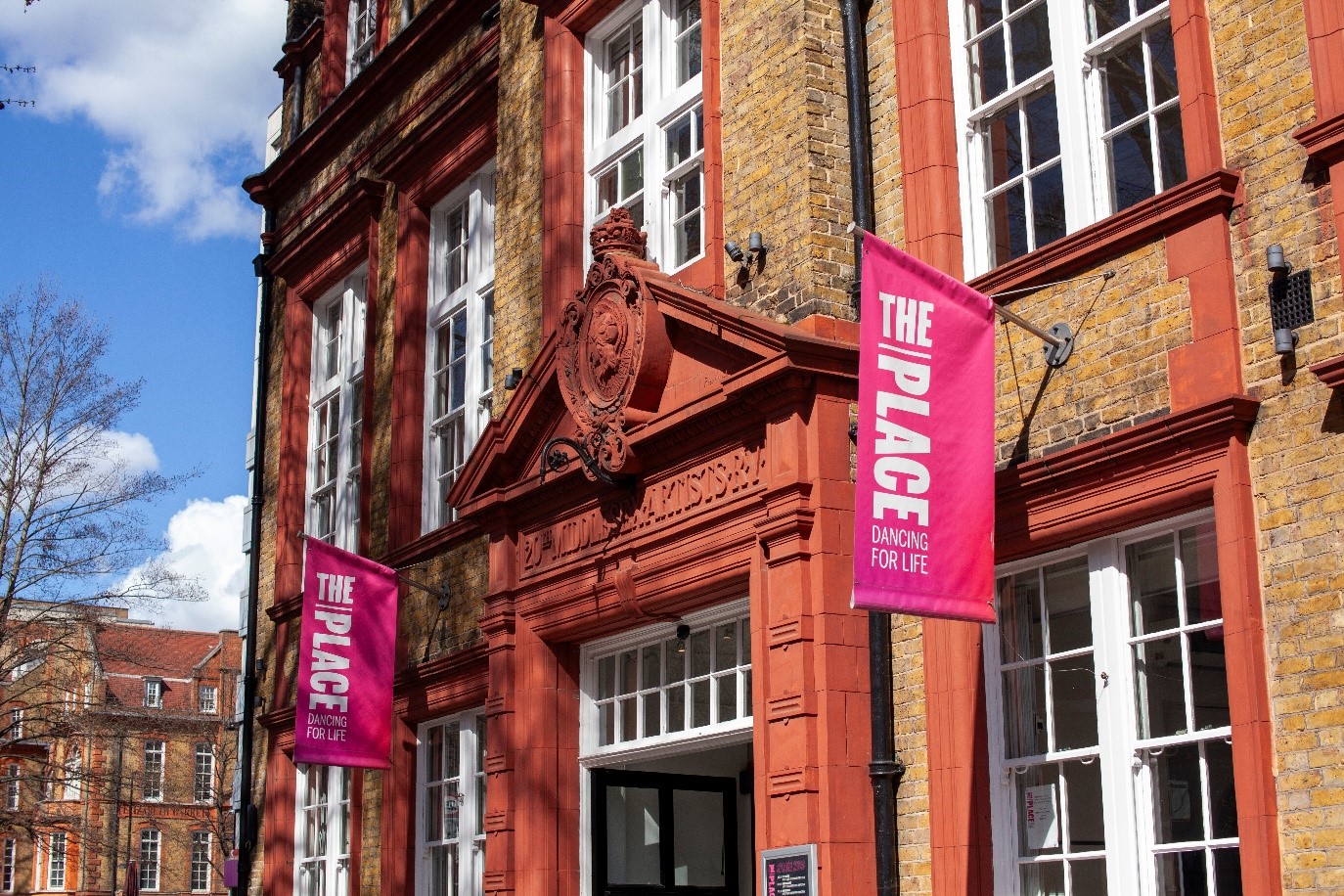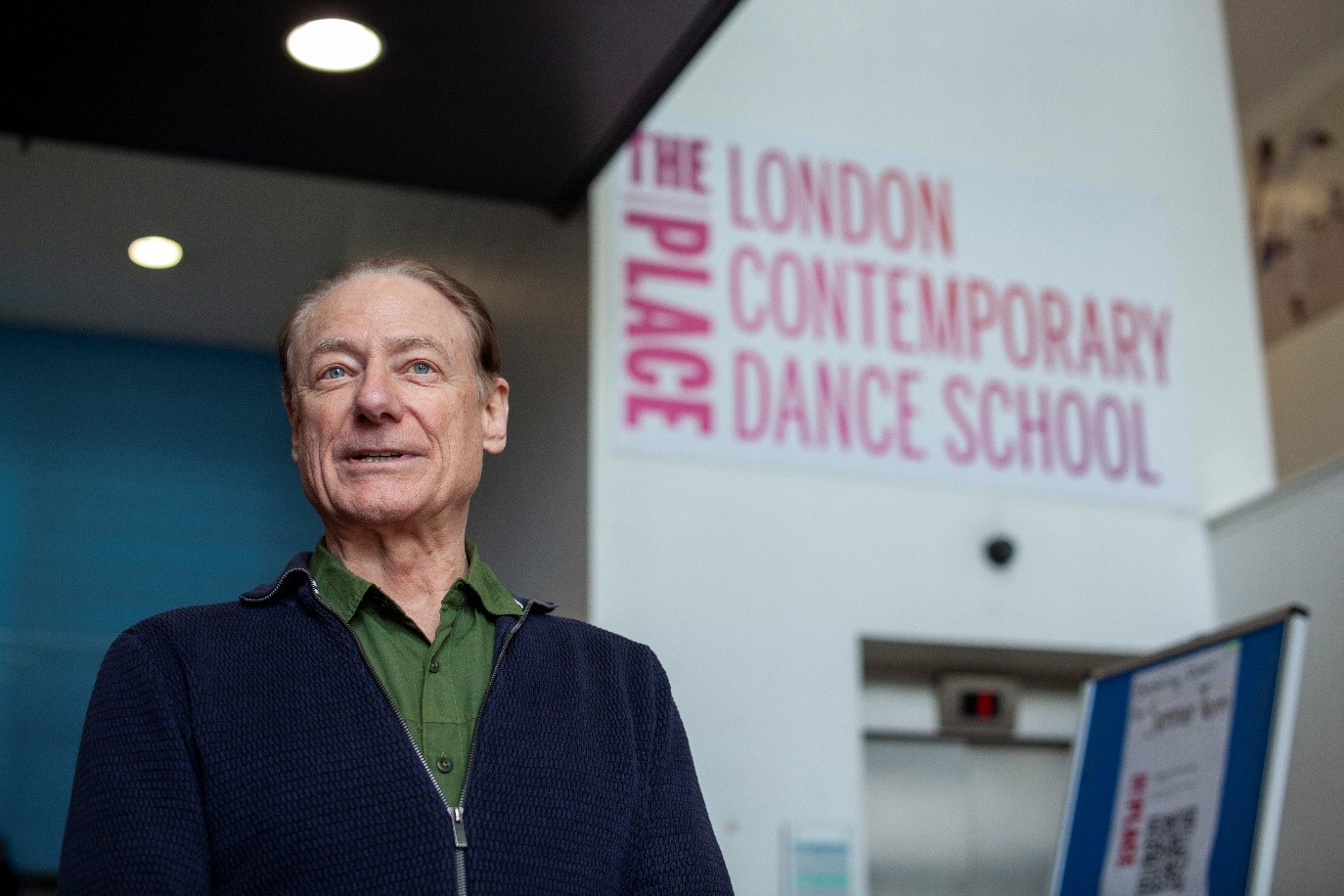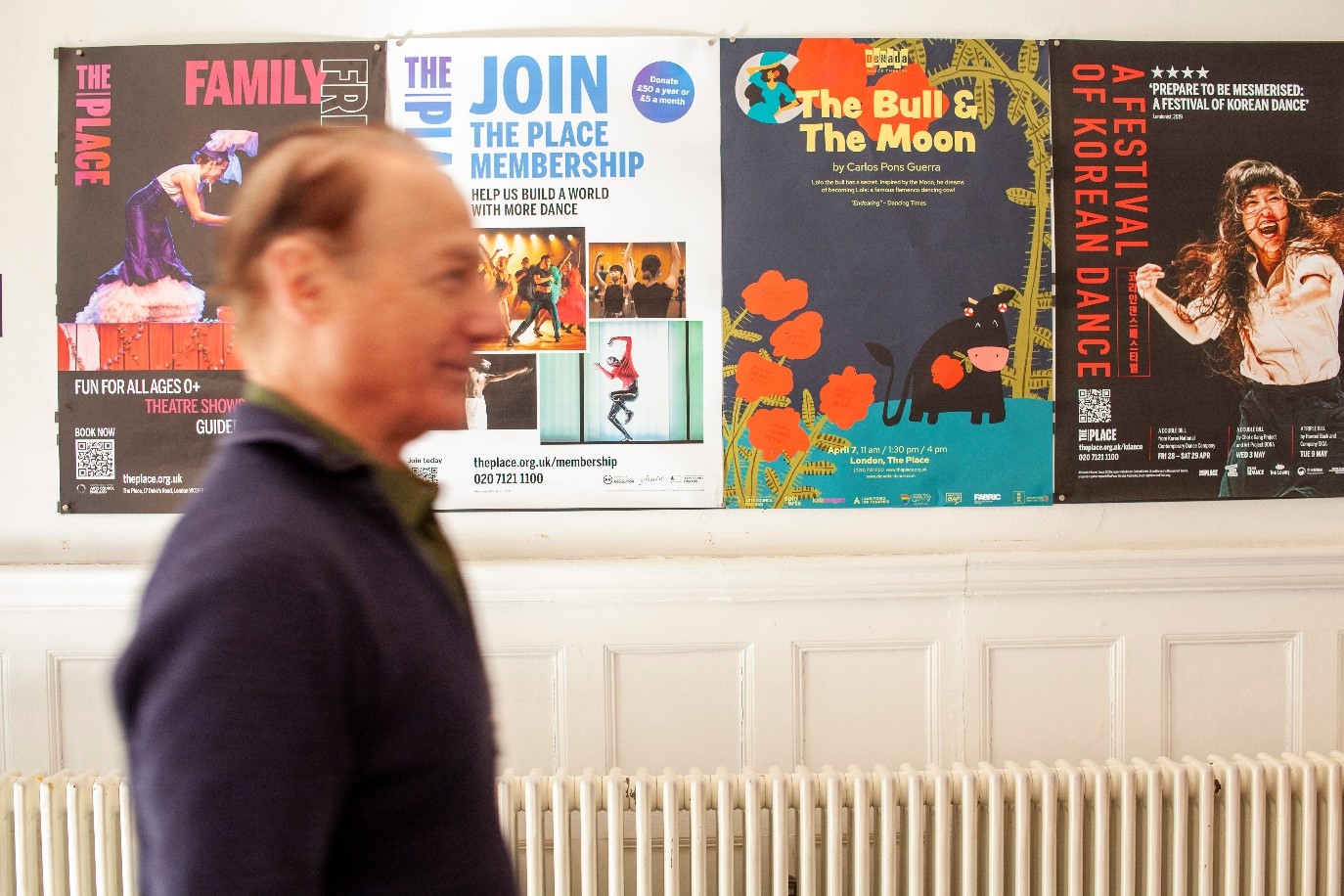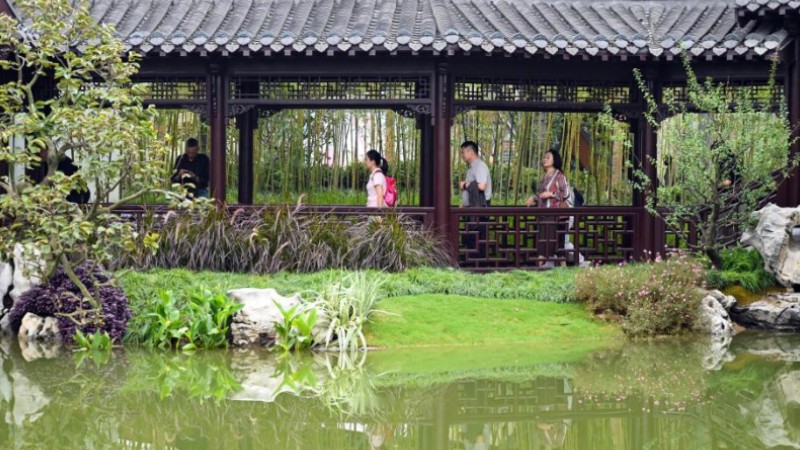Christopher Bannerman: Chinese philosophy meets contemporary dance in world cities
London is the home to some of the world’s most renowned performance venues, but none is quite like 14 Duke’s Road.
Late in the 1970s, the redbrick building became home to Britain’s first contemporary dance company, London Contemporary Dance Theatre, and its associated London Contemporary Dance School, coining its name as the Place Theatre. Ever since then, the Place has established itself as a hub for combining dance education, creative choreography and artistic marketing.
In 2013, the Place Theatre welcomed dancers and choreographers from Beijing, Taipei and London for a themed iteration of the intercultural project ArtsCross. Unifying this diverse crowd is a pursuit of both creative process and intellectual discourse, a duality that is best embodied by its Founding Director, Prof. Christopher Bannerman of Middlesex University. As Prof. Bannerman walks us through the corridors and rooms of the building where he once performed, he shares his personal journey from a dancer to a scholar, and how Chinese philosophy has always influenced him since childhood.
A dancer and a scholar

The Place Theatre (Photo/Lewis McCarthy)
People’s Daily Online: At a young age, you trained and performed as a classic ballet dancer with the National Ballet of Canada. What brought you to Asia and Europe in the first place?
Christopher Bannerman: I trained in ballet originally in Canada and eventually made my way to the National Ballet School of Canada and then joined the National Ballet of Canada. I had been focused on dancing, you know, so intensively from the age to about 15 and I was the only person in my school who didn’t go to university. I felt that in Canada was sort of quite an isolated experience and I felt like I wanted to explore the world.
As I reflect on my time living at home as a teenager, many of my father's books were focused on East Asian and South Asian philosophy, and that link to philosophy led me to travel to South Asia. And in fact, I spent almost a year in India and I practiced yoga there and also saw some dance performances. It's just another kind of world of dance. As a part of my journey back to Canada I arrived in the UK and then I discovered a friend was here and he was in a company called the London Contemporary Dance Theatre. And today we're in the building where the London Contemporary Dance Theatre had its home.
People’s Daily Online: Throughout your dancing career you were well versed with both classical ballet and new dance, and eventually began to teach dance at a UK-based university. How did this change in role from professional dancer to professor enable you to connect with China?
Christopher Bannerman: I was lucky enough that, when my dancing career had to end as every dancer does, I was able to move into higher education at Middlesex University. It had quite strong international connections that were just developing. And then I was also active in the dance world in both with the Arts Council England and with an agency called Dance East. They developed a programme for artistic directors called Rural Retreats. In 2007 we held the seminar in Switzerland and included people from the National Ballet of China, including the artistic director and an interpreter.
There was an occasion that I sat down and had a conversation with the interpreter, whose name was Xu Rui. In that conversation we touched on Chinese philosophy which seemed to influence Xu Rui a lot and we started the idea of developing a kind of international exchange in the form of what you might call an intercultural dance project. The fact that I had an interest in Chinese philosophy and knew something about China meant that this conversation was deeper than just the kind of transactional exchange of choreographers to create dances together.
From philosophy to choreography

Christopher Bannerman (Photo/Lewis McCarthy)
People’s Daily Online: Soon after your initial conversation with Xu Rui, you were invited to visit the Beijing Dance Academy (BDA). What was your impression of the institution and how did this trip further your collaborations?
Christopher Bannerman: Some months after my first meeting with Xu Rui in Switzerland I was contacted by him saying, I’ve got some funding, please come to Beijing. So I thought, well, that's extraordinary. And I went to Beijing for the first time in 2008. My feeling was that it was the centre of both government and in a sense a cultural centre. And of course, as far as I'm aware, the Beijing Dance Academy is unlike any other dance institution in the world. It's far bigger in terms of its number of studios and in terms of its range of topics, range of subjects, the old dance subjects, you know, from ballroom dancing to ballet to Chinese classical dance to folk dance. It's all there.
At BDA Xu Rui and I had a chance to have meetings about developing the project and we sort of conceived of a project that would use Chinese dancers, and dancers would be from the resident Beijing Dance Academy Company, but we would bring UK choreographers and organize the project so that two choreographers would work at the same time, one from China and one from the UK. We named the project DansCross and set in place something that we thought was an enabling structure to allow the artists to work and to experiment. And the Chinese dancers responded amazingly well by the end of the project. They were improvising freely and enjoying it and looked amazing on stage. So there were many positive things to come out of it.
People’s Daily Online: After the successful performances at DansCross 2009, Taipei University of Arts joined, and the project gained a new name – ArtsCross. On what occasion was the new partnership formed?
Christopher Bannerman: DansCross 2009 had been an amazing success and it was sort of a very important moment for my life and my dance life. And so Xu Rui and I really thought that we must continue this. So, I came back to London and was discussing it with friends and colleagues. Eventually I came into contact with a woman named Jennifer who was working here and with an organization called Step Out Arts focused on dance and other forms of East Asian heritage.
And she said, oh, by the way, there's some people coming, you know, from Taipei, Taipei University of the Arts and maybe you'd like to meet them. So, of course, I said yes. And we went out for dinner, and I told them about the project. And the next day they called to say, would it be possible for us to join this project?
So, then I emailed Xu Rui: I've got an idea. Xu Rui, being that remarkable person that is amazingly open minded, said, let me discuss this here at the Beijing Dance Academy, but I think that sounds like a good idea.
People’s Daily Online: With a new partner, what new structure was put in place to ensure that the performances reach their full potential?
Christopher Bannerman: For the new ArtsCross project we set out with the idea that we would rotate the project around the world. So we went to Taipei in 2011, we had hoped to come to London in 2012, but we were unable to because the Olympics were in London and everything was crowded. So we went to Beijing in 2012 and then came to London in 2013 and we tried to maintain that rotation throughout the years, although Covid did cause some disruptions.
We see this project as city-based and the cities that we were involved in were all world cities, cities that are dynamic, growing, changing and to some extent multicultural. Each one of them is unique in their own way and therefore we were tailoring the project to that partly through developing a theme for each event and iteration of our ArtsCross project.
Next year in 2024, we are planning an event in Taipei and hopefully starting the rotation again.
A changing world of dance and education

Christopher Bannerman (Photo/Lewis McCarthy)
People’s Daily Online: The ArtsCross project is deeply rooted in Chinese philosophy. How were the performances received in the West?
Christopher Bannerman: We came to London in 2013. We were here at the Place Theatre and the team was quite worried about our performances because they thought, you know, this is a new area of East Asia-UK collaboration. We were not sure we would get enough people in the theatre. What we hadn't really factored in was how many East Asian students there are in London. And how that network would provide an audience. And it did provide an audience – so many that we had to open the dress rehearsal to an audience and make it public.
So this is also of a changing world, changing demographics, changing mobilities, changing interactions. I think we're only sort of providing a vehicle through dance of something that's already happening in the world, but it's just not being captured or recognized.
People’s Daily Online: Now on its 12th year and having endured the difficulties brought by the Covid pandemic, ArtsCross has proven its longevity and popularity. Prof. Xu of BDA, Prof. Wang of TUA and you at Middlesex University have also led the project for more than a decade. What is your vision for the project in the near future?
Christopher Bannerman: I have to say, of course, at some point I'm going to have to be attending ArtsCross events in a different role. Hopefully as a founding director, I will be invited to the performances. But somebody else will be doing the work of developing the projects and working on them. I will be there ready to help, but I probably can't carry this on indefinitely. And so, we have to think about succession as well.
We are thinking about further developments, too. I think we need to form a better and stronger relationship in the UK like other conservatories around the world. Places like the Beijing Dance Academy, Taipei University of the Arts, University of Taipei and Hong Kong Academy for the Performing Arts have a ready-made dancer cohort whereas I've usually brought in dancers from different institutions. But I think now is probably the time to formalize this a little more and to form a relationship with the conservatory here in the UK that can be a partner in that project.
People’s Daily Online: As you gradually start to think about succession in the ArtsCross Project, is there any project that you wish to pursue on a more personal level?
Christopher Bannerman: My situation and my mind – the way I think about my career and the way I think about the world – has changed a lot because of the ArtsCross project. And I suppose that's why I feel strongly about developing UK education in the way that it communicates better internationally, not just projecting itself in and of itself. But to be able to interpret itself better to different context and to understand other contexts better. And of course, the great tradition of education in East Asia and the Confucian tradition is something that is an example that we could look to and see ourselves in relation to because definitely the principles of teaching are not confined to one culture and there are principles that we could definitely learn from.
And again, I'd have to credit my father. Although at the time of my dancing life when I decided to become a dancer, I thought I was rebelling against my father who was this philosopher with all these books. I'm not interested in becoming that university person. I'm going to be a dancer. However, those books were really foundational to my understanding, and therefore, the notion that we were involved in a project that's based on reciprocity is based on a kind of achievement of harmony space and form in which we can improvise and collaborate, work together.
So rather than it being simply, okay, we're bringing our working methods here into this context and showing you how to do it. This is absolutely about exchange between cultures.
Photos
Related Stories
Copyright © 2023 People's Daily Online. All Rights Reserved.









